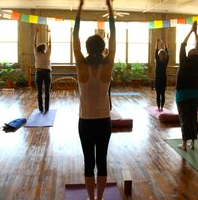Shining light on criticism leads to consciousness leads to compassion leads to positive change…and back again.
For most of my years on earth so far, I’ve let the wheel in my mind spin unawares and it carried me into some pretty dark places. When the light of truth started to show, I began to watch the ego wheel slow and the heart wheel start a turnin’. Exciting, but also hard. There is so much gunk in my wheels.
In his book The Heart of Yoga: Developing a Personal Practice T.K.V. Desikachar says, “Changes of mind can be observed primarily in our relationships with other people. Relationships are the real test of whether we actually understand ourselves better.”
It is said that the qualities we most often criticize in others are the ones we secretly despise in ourselves. There is no better example in my life than my marriage. As I’ve faulted my husband for various issues over the years, the same years I was deepening my Yoga practice, I first became more hateful and more critical as the light of Yoga on myself showed the concurrent hate me-hate him habit. The gunk was (is) caked on.
But Yoga is also teaching me that when we become consciously aware of our own faults (the stage where it seems like ignorance is bliss) and practice forgiveness and kindness with ourselves, we find that same external criticism turning into a deep compassion.
When we discover those qualities in ourselves that we dislike, the first step to compassion is recognizing that the quality we possess is not who we are. In her article “Nurture the New You” developmental psychologist Kelly McGonigal explains, “Basically, you’re mistaking the behavior you want to change for who you are, rather than seeing it for what it is—a pattern or habit that’s not serving you.” (Yoga Journal Feb. 2011: 82) I gravitated (by the grace of God) toward Yoga because I knew that the mean things I do and say to the people I love aren’t me. No wonder I’ve been so unhappy…instead of just being, I’m being stuff I do.
With this awareness we might find forgiveness and compassion for others comes easier. But it is often harder to move toward that in ourselves.
Although it starts with an awareness and acceptance, says researcher Kristin Neff compassion goes further by having “an active element of caring, of wanting the best for yourself. It means saying to yourself, ‘I want to heal, to be happy, to be healthy,’ and knowing that sometimes requires you to make a change.” (“Nurture the New You.” Yoga Journal Feb. 2011: 123) I like this. It isn’t some woo-woo excuse, “Oh, it’s not your fault for being a bitch Clare.” There is personal responsibility, but without further self punishment. It is my fault for not knowing, it is my fault for knowing but not efforting a change, and the best way to get out of it isn’t to keep doing it to myself.
But without quick transformation, substantial shifts, or rapid results, the inner critic tends to arise with teeth bared. Going back to acceptance of the process, the gradual process, with forgiveness and understanding, has been researched and shown to be a more effective path than trying to change a negative trait via negative reinforcement.
It is a circular process within us that shows up in direct correlation to our actions in the world. Criticism, consciousness, compassion, maybe change…gunk it up and start over with something new to be aware of… Allowing the wheel to turn in the light of day through the rocks and the breaks and the traffic jams will ensure that it advances, however slowly, toward freedom and happiness and love, both within and without.
But still, hon, can you please brush the damn cat? The wheels of my writing desk chair are gunked with her fuzz and I can’t roll easily to my bookshelf. And you know my Bible and Yoga Sutras are my WD-40…
How are you rollin’ today?










Read 5 comments and reply